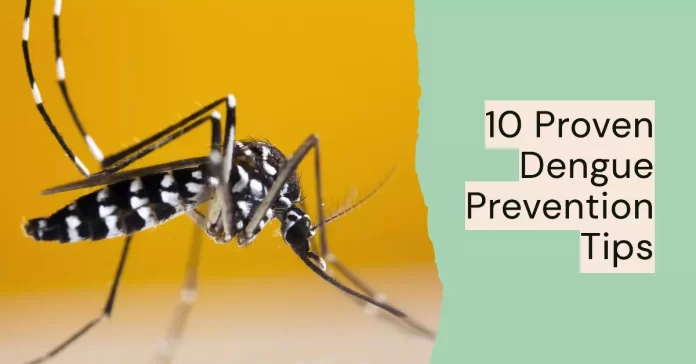Dengue fever, a mosquito-borne viral infection, can make you seriously ill. Fortunately, there are proven ways to protect yourself from dengue. We will share ten effective strategies to keep those pesky mosquitoes at bay and reduce your risk of contracting dengue.
Here are the 10 Proven Dengue Prevention Tips to Stay Safe from Mosquitoes
Mosquito Repellent
Invest in a good mosquito repellent. Apply it to exposed skin and clothing before heading outdoors. Look for a repellent that contains DEET or other recommended ingredients for maximum protection.Long Clothing
When dengue-carrying mosquitoes are active, wear long-sleeved shirts and long pants. It provides an extra barrier between your skin and these disease-spreading insects.Window and Door Screens
Put screens on windows and doors to stop mosquitoes from entering your house. Repair any holes or tears in existing screens promptly.Air Conditioning
Use air conditioning or window screens to keep mosquitoes out while you sleep. Dengue mosquitoes are active during the day, but some may sneak in at night.Eliminate Breeding Sites
Dengue mosquitoes breed in stagnant water. Regularly check your surroundings for standing water in containers like flowerpots, buckets, and old tires. Empty or cover them to prevent mosquito breeding.Clean Drains
Keep drains clear of debris to prevent water from pooling. It also reduces potential mosquito breeding grounds.Stay Indoors During Peak Activity
Dengue mosquitoes are most active during the early morning and late afternoon. Stay indoors during these times when the risk of mosquito bites is higher.Bed Nets
If you’re in an area with a high dengue risk, use bed nets treated with insecticide. It provides an extra layer of protection while you sleep.Community Efforts
Get involved in community mosquito control efforts. Support local initiatives to reduce mosquito breeding sites in your neighborhood.Seek Medical Attention
If you experience dengue-like symptoms, such as high fever, severe headache, joint and muscle pain, rash, or bleeding, seek immediate medical attention. Early detection and treatment are crucial for managing dengue.
Conclusion
In the battle against dengue, knowledge, and preventive action are your best allies. Dengue may be a formidable opponent, but by following these proven prevention tips, you can significantly reduce your risk of infection. Remember, dengue prevention isn’t just an individual effort; it’s a collective one. You’re contributing to the safety of your community by protecting yourself. So, stay informed, stay vigilant, and together, we can keep dengue at bay.
Frequently Asked Questions (FAQs)
What is dengue, and how is it transmitted?
Dengue is a viral illness transmitted through the bite of infected Aedes mosquitoes, primarily the Aedes aegypti mosquito. The virus can’t be passed directly from one person to another.
Where is dengue most commonly found?
Dengue primarily affects tropical and subtropical regions globally, especially in Southeast Asia, the Pacific Islands, the Caribbean, and Central and South America.
What are the common symptoms of dengue fever?
Common symptoms include high fever, severe headache, joint and muscle pain, rash, and bleeding. Severe dengue cases can result in dengue hemorrhagic fever or dengue shock syndrome.
How can I reduce my risk of contracting dengue?
You can reduce your risk by eliminating mosquito breeding sites, using mosquito repellent, wearing protective clothing, and using mosquito nets or screens.
What steps should I take to prevent mosquito bites?
Use mosquito repellent containing DEET, wear long sleeves and pants, and use mosquito nets or screens when sleeping.
Are there any specific precautions for travelers to dengue-prone areas?
Travelers should take extra precautions, such as staying in air-conditioned or well-screened accommodations and using bed nets. Stay informed about local dengue outbreaks.
What should you do if you suspect you have dengue fever?
Seek medical attention immediately. Rest, stay hydrated, and take acetaminophen for pain and fever, but avoid non-steroidal anti-inflammatory drugs (NSAIDs).
Is there a vaccine for dengue?
Yes, vaccines for dengue exist. However, their availability varies by region, and they may not provide immunity against all strains of the dengue virus.
What are the differences between dengue and other mosquito-borne diseases like Zika and malaria?
Although these diseases have similar symptoms, they originate from distinct viruses. Parasites cause malaria, the Zika virus causes Zika, and the dengue virus causes dengue.
How can I help raise awareness about dengue prevention in my community?
You can raise awareness by educating others about dengue prevention, supporting local mosquito control efforts, and promoting community clean-up campaigns to eliminate breeding sites.
- The Impact of Smoking on Lung Health: 10 Harmful Effects of Cigarettes
- Breaking Down Rabies: Causes, Symptoms, Treatment and Prevention
- What to Do If Bitten by a Dog: Steps for Rabies Prevention
Dengue Vaccine Clinical Trials
According to the article from the National Library of Medicine Research, efforts to develop dengue vaccines have extended over several decades due to the absence of a licensed vaccine for this potentially life-threatening disease. Scientists are exploring various vaccine types, including live attenuated virus vaccines, inactivated virus vaccines, DNA vaccines, and subunit vaccines. Despite more than 60 years of dedicated research, a commercially available dengue vaccine remains elusive. Presently, there are 60 ongoing dengue vaccine studies worldwide, each in different stages of development.











